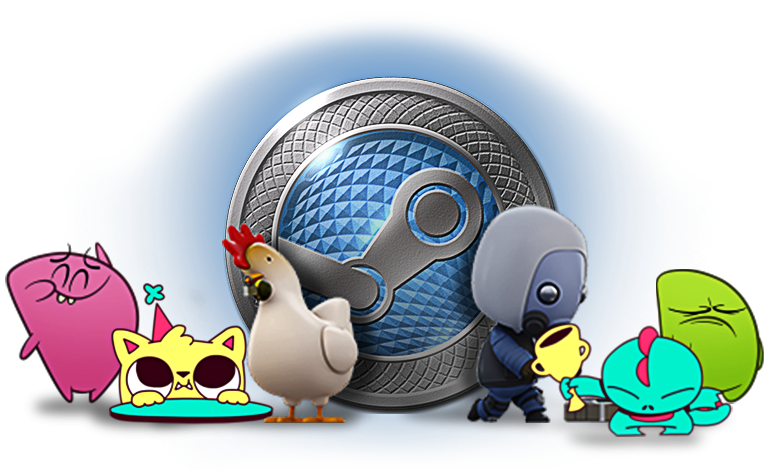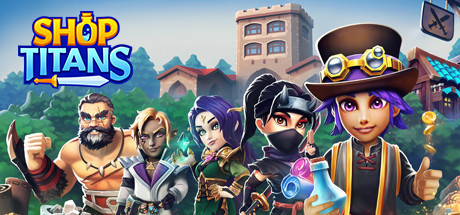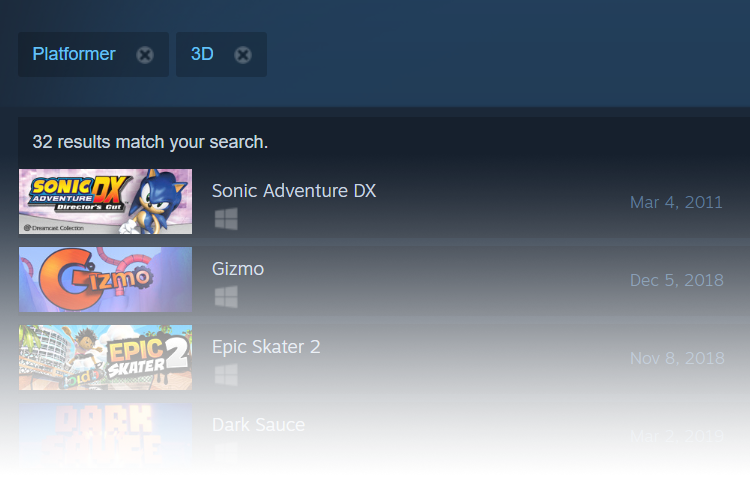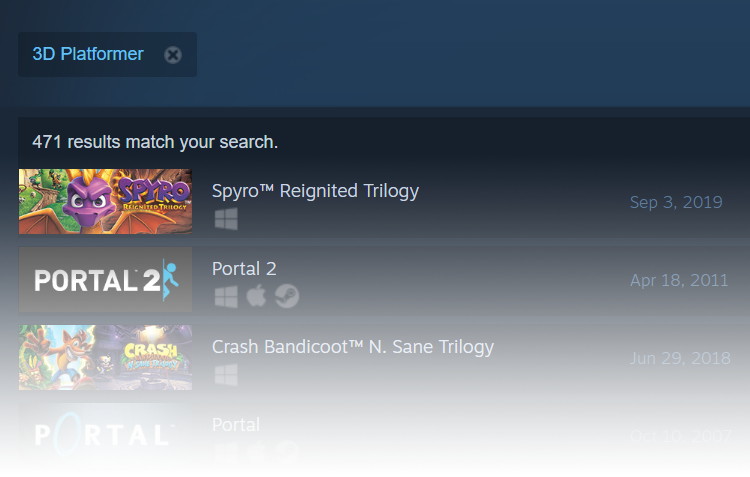
Jul 13, 2020
Steam News - christen
This July marks the one year anniversary of Steam Labs, which launched with three experiments and big ambitions to improve Steam through public experimentation and iteration. Today we’re celebrating with the official release of Community Recommendations, introduced to Steam via Labs.
Steam Labs is a space to explore the potential for new and improved versions of Steam through inquiry, exploration, and conversation with you. The most pivotal part of our design process is the moment where you come in, and with Labs we’re able to include you much earlier. To assess what works and what doesn’t, we’ve been listening to your feedback, gathering evidence to learn how people use our experiments, and conducting A/B tests to measure relative success among potential designs.
Below is some background on what we have learned in the Labs during the past year, and how it led us to ship four experiments, shelve two, and continue to design and refine others on the way. Each has reinforced the value we derive from a participatory design process. So thanks, and cheers, to another great year of experimentation together!

During experimentation, we learned that players wanted to be able to exclude games that they considered outliers or mistakes in their play history, so we added this. Additional feedback led us to include the ability to eliminate a played game from influencing recommendation results, and to ignore recommendations that you already own on another platform. We also added the ability to save your preferences and view your recommendations directly on the home page of the Steam Store.
During experimentation, we tried replacing the typical paging mechanism with a format that continuously loads results as you scroll, but we learned that many players preferred the old way, and so that was turned into an option. We also learned players wanted a way to exclude results associated with tags, so variations were built and tested to make that happen. Using Search, it’s now possible to bookmark powerful, specific searches like this one, which offers direct access to the community’s top-rated non-violent side-scrolling platformers with support Remote Play Together with up to four friends.
User reaction quickly revealed that the longer format just wasn’t working, as viewers typically bailed within the first few minutes of those shows. We also found that each time we wanted to feature a specific selection of games, such as in the Steam Awards, we ultimately chose to hand craft it, rather than automate its creation, to achieve our communication goals.
While we remain optimistic that an automated show could one day make for a compelling way to learn about games, today is not that day. And so with film editing job security intact for the near term, we say TTFN to the Automated Show.
Perhaps the most valuable takeaway from our Deep Dive experimentation has been the idea behind its Similar Tags matching algorithm. This allows us to organize the hundreds of Steam tags into a handful of meaningful categories that can be leveraged to help gauge similarity along interesting axes like genre and mechanics.
This tag categorization work led us to identify relationships between tags, features, and other kinds of metadata associated with Steam games, resulting in our Query Expansion experiment and the Tag Wizard, a tool we built to help devs associate their games with a broad range of tags for improved discovery. It also inspired the creation of internal tools we use to identify and organize games associated with big events, and has led us to consider new navigational systems we’re excited to experiment with in Labs.
Before calling this experiment complete, our goal is to bring this logic to more views throughout Steam, such that a search for both Real-Time and Strategy, for example, will always produce the same results as when searching for RTS. Many of our store’s browse views stand to benefit from this work.
Today, Micro Trailers can be found on the Steam store, where they are featured when hovering on items on the home page, in our sales events, and in the Interactive Recommender. We’re still tinkering with their optimal format, duration, and presentation, and look forward to bringing them to more places throughout Steam.
Steam Labs is a space to explore the potential for new and improved versions of Steam through inquiry, exploration, and conversation with you. The most pivotal part of our design process is the moment where you come in, and with Labs we’re able to include you much earlier. To assess what works and what doesn’t, we’ve been listening to your feedback, gathering evidence to learn how people use our experiments, and conducting A/B tests to measure relative success among potential designs.
Below is some background on what we have learned in the Labs during the past year, and how it led us to ship four experiments, shelve two, and continue to design and refine others on the way. Each has reinforced the value we derive from a participatory design process. So thanks, and cheers, to another great year of experimentation together!

Shipped Experiments
With your help, the following experiments graduated from the Labs to Steam, where they’re helping people discover and find a wider range of games.Community Recommendations
Today’s launch out of Steam Labs, Community Recommendations showcases your reviews by featuring them right on our home page for everyone to see. The result brings community energy to the store, enabling users to keep abreast of the titles players are currently enjoying, and why. This new feature also allows us to get out of the way as platform holders, connecting and empowering players so they can recommend games to one another directly.Interactive Recommendations
The Interactive Recommender began as an experiment to determine whether machine learning could be used to generate compelling personalized recommendations for players. The result is a system that trains itself to recognize gameplay patterns among the millions of players on Steam.During experimentation, we learned that players wanted to be able to exclude games that they considered outliers or mistakes in their play history, so we added this. Additional feedback led us to include the ability to eliminate a played game from influencing recommendation results, and to ignore recommendations that you already own on another platform. We also added the ability to save your preferences and view your recommendations directly on the home page of the Steam Store.
Play Next Suggestions
After gaining confidence in machine learning through Labs experimentation, we decided to build Play Next, which leverages the same tech as the Interactive Recommender to suggest games you already own but have yet to play. After testing this version of the recommender with players in Labs, the feature moved to its current home directly in the Steam Library. There, users can add a Play Next shelf to their collection and use it to view Steam’s suggestions from their own library. These suggestions are based upon their gameplay history as it compares to millions of other players.Powerful Search Tools
Steam Labs became the perfect place to try out some often-suggested (and much-needed) upgrades to Steam search, without altering the store during this exploratory process. A number of new tools requested by players were added, such as ways to filter results by price, view only items that are on sale, and exclude items already owned, wished-for, or ignored. During experimentation, we tried replacing the typical paging mechanism with a format that continuously loads results as you scroll, but we learned that many players preferred the old way, and so that was turned into an option. We also learned players wanted a way to exclude results associated with tags, so variations were built and tested to make that happen. Using Search, it’s now possible to bookmark powerful, specific searches like this one, which offers direct access to the community’s top-rated non-violent side-scrolling platformers with support Remote Play Together with up to four friends.
Shelved Experiments
Steam Labs is a great place to quickly try new ideas, providing us with insight about player preferences and usage. Inevitably, not every experiment we choose to pursue will resonate with you, and so today we've shelved a couple of them to make way for new experimentation.The Automated Show
The Automated Show was an ambitious project, with the goal of creating an entertaining production about games, built in a fully automated fashion. Formats ranged from 2 to 30 minutes and experimented with features such as typographic and motion design effects, announcer voice-overs, theme-driven automated curation, and simultaneous streams to deliver maximum information in minimal time. User reaction quickly revealed that the longer format just wasn’t working, as viewers typically bailed within the first few minutes of those shows. We also found that each time we wanted to feature a specific selection of games, such as in the Steam Awards, we ultimately chose to hand craft it, rather than automate its creation, to achieve our communication goals.
While we remain optimistic that an automated show could one day make for a compelling way to learn about games, today is not that day. And so with film editing job security intact for the near term, we say TTFN to the Automated Show.
Deep Dive
This experiment offered a way to browse the Steam store using a favorite game as an entry point for discovering similar titles. While it was fun to discover how many degrees of separation could be found between Battle Brothers and Strikey Sisters, or to discover little known but well-loved Gems somewhat similar to a favorite popular game, we found similarity-based browsing to be a tough sell as a destination.Perhaps the most valuable takeaway from our Deep Dive experimentation has been the idea behind its Similar Tags matching algorithm. This allows us to organize the hundreds of Steam tags into a handful of meaningful categories that can be leveraged to help gauge similarity along interesting axes like genre and mechanics.
This tag categorization work led us to identify relationships between tags, features, and other kinds of metadata associated with Steam games, resulting in our Query Expansion experiment and the Tag Wizard, a tool we built to help devs associate their games with a broad range of tags for improved discovery. It also inspired the creation of internal tools we use to identify and organize games associated with big events, and has led us to consider new navigational systems we’re excited to experiment with in Labs.
Experiments in Progress
Meanwhile, here’s a look at some promising experiments currently underway in Steam Labs. Each of these are progressing and expected to graduate to full release on Steam in the coming months.News & Events Hub
The Steam News Hub experiment allows players to explore a personalized feed of news, events, live-streams, and updates from games they play, follow, or wishlist. This feed can be customized to include or exclude certain types of events or sources of news. Most importantly, the experiment includes a look at what’s ahead with a reminder system that helps players keep tabs on in-game events, live-streams, and other scheduled activities.Query Expansion
We’ve begun some important yet fairly behind-the-scenes work in this Steam Search experiment, where we’re leveraging a custom thesaurus to define relationships between tags and related metadata for more accurate, consistent results. We’re using Steam Labs to help us gauge whether our thesaurus is working as you’d expect. You can opt into the experiment now via Labs, which then updates Search with the new logic used to derive tag-based search results. Before calling this experiment complete, our goal is to bring this logic to more views throughout Steam, such that a search for both Real-Time and Strategy, for example, will always produce the same results as when searching for RTS. Many of our store’s browse views stand to benefit from this work.
Micro Trailers
Micro Trailers offer video snapshots of games, in just a few quick seconds. People only take a short amount of time to make judgements about what’s interesting while scrolling content, so micro trailers aim to help viewers learn enough about a game in as little time as possible. In Steam Labs, we’ve experimented with different formats, lengths, and strategies for deriving automatically-generated micro trailers from the standard game trailers our partners provide. We’ve also explored various ways of auto-assembling and aggregating these short videos, some of which admittedly made our eyes spin. 🍭🍭 Today, Micro Trailers can be found on the Steam store, where they are featured when hovering on items on the home page, in our sales events, and in the Interactive Recommender. We’re still tinkering with their optimal format, duration, and presentation, and look forward to bringing them to more places throughout Steam.
The Future
We continue to find that our work only improves with iteration based on your feedback. Steam Labs has opened the possibility of sharing more nascent ideas, receiving earlier feedback, and improving Steam with help from millions of people, like you.News Hub Update
In a coming update, we’ll soon be adding the ability to include news from Steam Curators you follow, enabling posts from some of your favorite press outlets to appear right in your personalized view of Steam News. New Ways to Browse
To date, we’ve invested quite a bit of energy into recommendations and search. Browsing is of course another key way people discover content on Steam, and we’re excited to explore this space. New points of entry, more compelling ways to browse, and more tools to filter while browsing are all among our list of future pursuits for Steam Labs.Your Ideas
We of course also have our eyes on the Steam Labs Discussions, and hope you’ll continue to share your ideas for potential experiments you’d like to see from us.
























































































